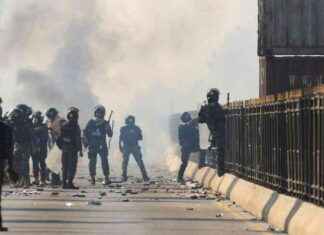a story of hope in the face of change, fear of new violence and irregularities in voting have taken place in the Democratic Republic of Congo, Sunday’s historic elections. Although AFP have been reported in the first hours of voting, no serious incidents, journalists and observers of the Church reported, but delays in Opening of polling stations and problems with the voting machines. To be elected a new Parliament, the new provincial governments, and a new President.
The course of the election will decide whether in the huge African country in crisis for the first time since independence in 1960, a peaceful and democratic change of government to succeed. The presidential election should have taken place according to the Constitution, actually, two years ago. As the incumbent, Joseph Kabila, however, refused, after two terms of office, assign, postponed the elections several times. Protests against the term extension were put down bloodily.
Nearly 39 million eligible to vote, were called upon, in the second-largest African country, a new Parliament, the new provincial government and a new President. Voting is a huge logistical and political challenge for the impoverished in terms of traffic barely-developed country whose recent history is marked by a number of bloody conflicts.
Kinshasa had refused logistical support of the for 20 years present in the country UN, as well as a Western election observer mission. Pope Francis called for prayer before thousands of faithful in St Peter’s square in Rome on Sunday to a “normal and peaceful” conduct of the poll in the Congo.
The multiple delays, the risk of problems on election day and allegations that the voting machines would deliver a distorted result, had, however, already in the run-up doubts as to the credibility of the election.
“the end of the dictatorship,”
AFP journalist and observer of the influence of the Catholic Church reported on Sunday, among other things, delays in Opening of polling stations: In the district of Limete, an opposition stronghold in the capital, Kinshasa, to protest voters against a large delay in the opening of the polling station, which was initially unable to open because of the voters ‘ lists templates.
The chief of the national electoral Commission (Céni), Corneille Nangaa, personally brought finally, the lists, which led to spontaneous protests. “Nangaa must understand that the population wants to Kabila and his Regime”, said parliamentary candidate Elvis Bulumbu with a view to Kabila.
The election observers of the Church stated in an interim report, to be that, at the beginning of the vote at 06.00 o’clock in the morning 830 polling stations have been closed due to late establishment, to long opening procedures or malfunctions in the voting machines. In addition, 846 election offices were pouring at non-approved places, such as “military camps, Beverage, and private homes” have been set up.
President Kabila agreed with his of him as the successor to the chosen Ex-Minister of the interior Emmanuel ramazani was the photographer Shadary in Kinshasa. Shortly thereafter, one of the opposition candidates, Martin Fayulu. “It’s a big day for me, a big day for the Congo,” said Fayulu. “It’s the end of the dictatorship.”
“I feel free, liberated,” said the 53-year-old official Victor Balibwa, issued in Lubumbashi in the Southeast of the country his voice. The 18-year-old student, Rachel, was in the Eastern part of Goma to the election, said: “I am excited to finally be able to choose, it is my first choice.” An elderly lady in Kinshasa told of the difficulties with the touch screen of the voting machine: “It is very complicated, I pressed the button without really knowing whom I have chosen.”
Massive protests, there had been, moreover, already, however, that in two conflict-affected regions in March to be voted on. Because the result of the presidential election will be in mid-January announced the inauguration of the new head of state is for the 18. January planned. In the displacement-affected city of Beni activists from the Protest organized on Sunday a symbolic choice local. “You can’t stop us from voting,” said the activist Manix. (sep/afp/sda)
Created: 30.12.2018, 14:21 PM






